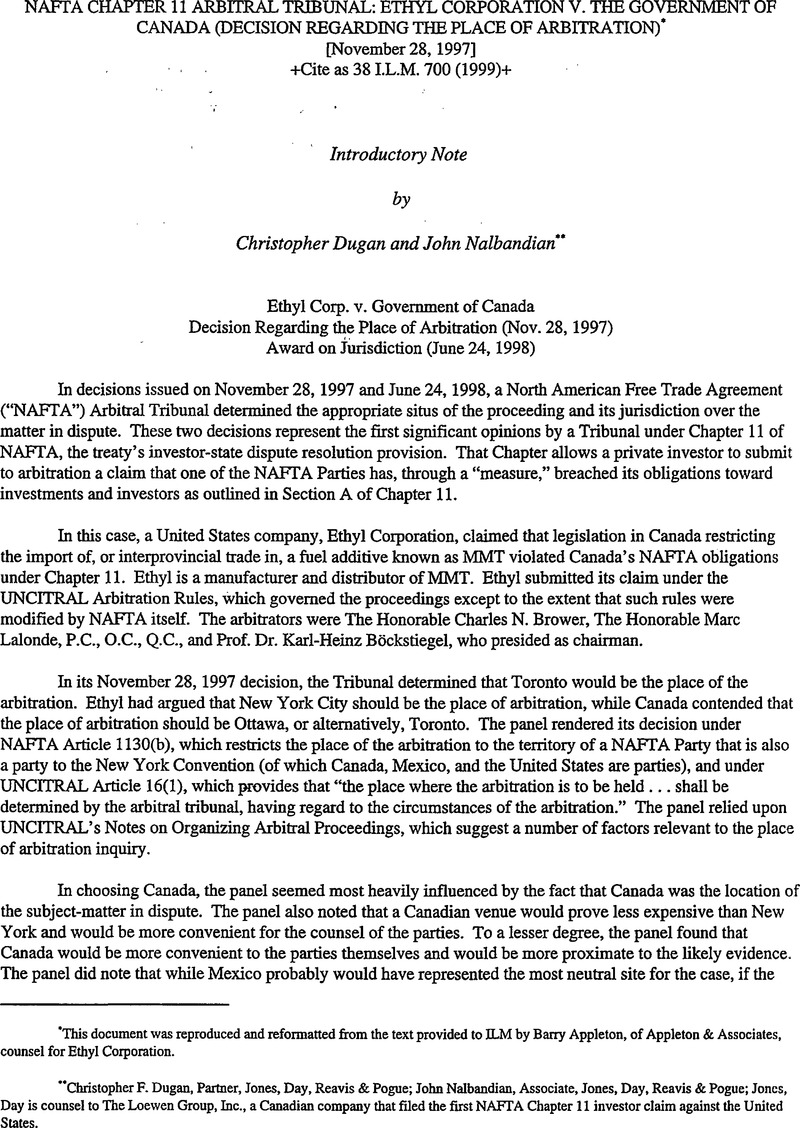No CrossRef data available.
Article contents
Nafta Chapter 11 Arbitral Tribunal: Ethyl Corporation V. The Government of Canada (Decision Regarding the Place of Arbitration
Published online by Cambridge University Press: 27 February 2017
Abstract

- Type
- Judicial and Similar Proceedings
- Information
- Copyright
- Copyright © American Society of International Law 1999
Footnotes
Jones, Day, Reavis & Pogueis counsel to The Loewen Group, Inc., a Canadian company that filed the first NAFTA Chapter 11 investor claim against the United States.
This document was reproduced and reformatted from the text provided to ELM by Barry Appleton, of Appleton & Associates,counsel for Ethyl Corporation.
References
1 Ethyl has abandoned its alternative proposal, made in its Notice of Arbitration, that the place of arbitration be Washington, DC.
2 See Introduction to the Notes, paragraph 2:No legal requirement binding on the arbitrators or the parties is imposed by the Notes. The arbitral tribunal remains free to use the Notes as it sees fit and is not required to give reasons for disregarding them.
3 Consideration (b) would appear not to be relevant here, given that all potential places of arbitration are in States Parties to the New York Convention.
4 Canada correctly points out that a sixth consideration, namely, “perception of a place as being neutral,” was eliminated from an earlier draft of the Notes as being “unclear, potentially confusing” although something that a tribunal “might wish to discuss… with the parties.” Report of te United Nations Commission on International Trade Law on the work at its twenty-eighth session (Vienna, 2-26 May 1995), U.N. Doc. A/50/17, paragraph 337, reprinted in Vol. XXVI Uncitral Yearbook (1995).
5 To date neither Canada nor Mexico is a party to the ICSBD Convention. Thus although the United States is a party to that Convention no present prospect of such an arbitration exists. Under Articles 20 and 21 of the ICSID Additional Facility Arbitration Rules, to which Article 1120 also allows resort, “the place of arbitration shall be determined by the Arbitral Tribunal after consultation with the parties and the Secretariat” and must be in a State Party to the New York Convention.
6 ICSID Convention Article 2 fixes the seat of the Centre at “the principal office” of the World Bank, ix., Washington, DC. While it is true, as Canada has noted (at paragraph 6 of its Reply Memorandum of October 22,1997), that Washington, DC is not thereby the “place of arbitration,” that concept itself is not relevant to the self-contained ICSID system.
7 The Tribunal, as previously noted, has the power, under NAFTA Article 1130(b), to select as the place of arbitration any situs in Canada, Mexico or the United States. The Tribunal notes that Ethyl (at page 5 of its Submission of October 16,1997) has “submitted that if this Tribunal finds that it is inappropriate to have the place of arbitration in either Canada or the United States, the Claimant suggests that the place of arbitration be in Mexico.” The Tribunal limits itself in this case, however, to the sites recommended by the parties. In doing so it emphasizes that it is in no way precluded by the parties’ respective proposals from considering other locations. It proceeds as it does because it believes the parties objectively have searched out those places that are most likely in fact to be most appropriate, “having regard to the circumstances of the arbitration.“
8 The Tribunal already has determined that criterion (b) - “whether there is a multilateral or bilateral treaty on enforcement of arbitral awards between the state where the arbitration takes place and the State or States ,where the award may be enforced” - is not “relevant here.” See note 3. supra.
9 The Tribunal does not believe, as Ethyl has suggested (at page 4 of its Submission of October 16,1997), that in determining the “convenience of the.. .arbitrators” it is relevant that “local offices of the law firms of both Messrs Lalonde and Brower” exist in New York City.
10 As regards Ethyl's counsel this point would appear to apply equally to New York city and Toronto.
11 Canada argues (at pages 9-11 of its memorandum of October 2,1997) also mat certain “related proceedings” are “additional factors that point to Canada as the appropriate place of arbitration”Those proceedings are (1) a suit by Ethyl's Canadian subsidiary seeking“a declaration...that [the relevant legislation] is of no legal force and effect” as well as injunctive relief, and (2) a formal complaint by the Province of Alberta against Canada which will be subject to dispute resolution proceedings.The Tribunal does not believe that the pendency of those proceedings has any bearing on its determination of the place of arbitration.
12 The fact that the Uncitral Notes omitted (see note 4, supra) “perception of a place as being neutral” from its list of criteria for selection of a place of arbitration because it was “unclear, potentially confusing” does not mean that such criterion cannot be considered. Uncitral,taking this step, itself indicated “that the arbitral tribunal before deciding on the place of arbitration might wish to discuss that with the parties.”


